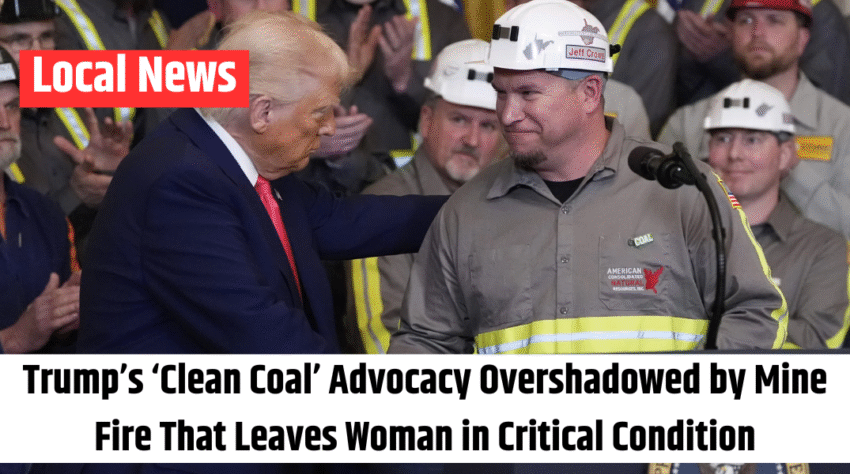CHARLESTON, W.Va. — While President Donald Trump recently touted the benefits of “beautiful clean coal” in a speech at the White House, a devastating explosion in West Virginia serves as a stark reminder of the ongoing risks posed by methane seepage from coal mines. Just days before the president’s remarks, a woman in the rural community of Thornton was seriously injured after methane from a nearby coal mine, likely linked to operations at Core Natural Resources’ Leer Mine, caused an explosion in her home.
The blast, which occurred early on April 5, 2025, resulted in severe burns for Kimberly Thomas, who suffered second- and third-degree burns over 20% of her body. Her husband, Arles Junior Thomas, was able to extinguish the fire with a fire extinguisher before calling 911. The couple, both in their 60s, has been dealing with the aftermath, with Kimberly receiving treatment at a Pittsburgh hospital.
The explosion occurred just three days before Trump’s announcement, where he vowed to end President Joe Biden’s policies on coal, claiming that the U.S. was reclaiming its place as a coal producer. As he made his remarks, mining executives from Core Natural Resources were present, even as local residents continued to deal with the devastating consequences of coal mining practices that have left them vulnerable to explosions from methane buildup.
State’s Response to Methane Risks
The West Virginia Department of Environmental Protection (DEP) has since ordered Core to temporarily halt mining in areas of the Leer Mine beneath homes, where the coal seam is dangerously close to the surface. The explosion and its aftermath have sparked investigations by state authorities, who have documented the presence of methane in the Thomas’ home at levels high enough to cause an explosion.
Also Read – How a West Virginia Engineering Feat Connected Appalachia in 1977
In a move that many see as overdue, the DEP has required Core to revise its permit for monitoring methane emissions and prohibited mining activities near homes until the new safety measures are implemented. Core has also been instructed to secure properties in the area and conduct continuous methane monitoring to prevent future incidents.
In addition, the incident underscores a broader pattern of concerns about the longwall mining technique employed at the Leer Mine. This method, which involves the complete removal of coal seams, can result in large cracks in the ground above the mine, allowing dangerous methane to escape into homes and other structures. Despite warnings about these risks, the mining company continues to operate with minimal oversight from regulatory agencies.
Warning Signs Ignored
Before the explosion, local law firm Mullens & Mullens had already flagged the dangers of methane migration from the Leer Mine. The firm had warned both Core Natural Resources and its predecessor companies about the risks of methane accumulation in homes above the mine, but their concerns went largely unaddressed. More than two years prior to the explosion, the law firm had raised alarms following the evacuation of a neighboring family, the Nestors, due to high methane levels in their home.
Jack Spadaro, a former top mine safety official, had also expressed concerns about methane buildup in the Thornton area in 2022. Despite these repeated warnings, action from both the mining company and state regulators was insufficient, according to Mullens.
The Broader Impact of Coal Mining on Communities
The ongoing risks associated with methane seepage and the extraction methods used by companies like Core are not isolated to West Virginia. Similar incidents have occurred in other mining regions, including Alabama, where an explosion in 2024 at the Oak Grove Mine claimed the life of a man and left his grandson critically injured. In both states, longwall mining has been blamed for creating conditions that allow methane to accumulate, creating deadly explosion risks for residents living above active mines.
As the president continues to push for policies that prioritize coal production, environmental and safety concerns persist. Despite his rhetoric surrounding “clean coal,” the reality remains that coal mining poses serious environmental and health risks, including air pollution and the release of methane—a potent greenhouse gas. Methane is 80 times more effective at trapping heat in the atmosphere than carbon dioxide over a 20-year period, contributing to the climate crisis that Trump’s policies seem to overlook.
In light of the explosion in West Virginia, local communities are calling for stricter oversight of coal mining operations, particularly those using longwall mining techniques. The Thomas family, as well as others in the area, are now left grappling with the physical and emotional toll of an industry that has long been a fixture in the region, yet continues to pose a danger to the very people who live nearby.
As West Virginia officials investigate the explosion and the dangers associated with mining in the area, the focus now turns to whether enough will be done to prevent further tragedies like the one the Thomas family experienced. The public’s outcry, alongside legal action from affected families, may be the catalyst needed for real change in an industry often resistant to reform.
